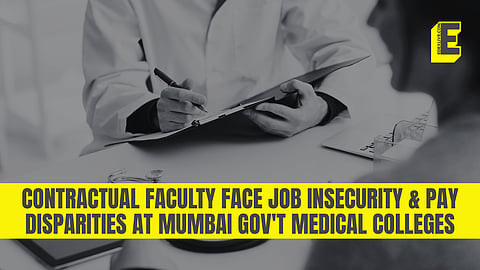

Mumbai’s civic-run medical colleges are facing an escalating crisis as assistant professors struggle with alleged job insecurity, stagnant pay, and a lack of permanent recruitment.
As highlighted by health activist Dr Abhinav Wagh, these institutions require over 900 assistant professors; however, only about 250 posts are currently filled — and that too on a purely contractual basis.
Despite the Maharashtra Public Service Commission (MPSC) conducting regular exams for government medical colleges, the Brihanmumbai Municipal Corporation (BMC) has failed to publish recruitment advertisements since 2017, leaving over 550 posts vacant.
“We have no future here”
The frustration among assistant professors is palpable.
They are tasked with running outpatient departments, handling emergency cases, performing surgeries, and teaching both MBBS and MD students. Yet, their compensation does not reflect their responsibilities.
“The payment issue is huge,” said Dr Abhinav Wagh, a health activist who has been raising this issue for years.
“Despite having more experience than senior residents, assistant professors are paid the same or even less. There are no dearness allowances, no pension, no maternity or paternity leave, and no scope for promotion,” he added.
In a functional system, assistant professors would eventually be promoted to associate professor roles based on their years of service. But with no permanent appointments, no promotions have taken place.
One assistant professor, speaking on the condition of anonymity, told EdexLive, “Our colleagues in Maharashtra’s government-run medical colleges don’t face this. They are recruited through MPSC and have job security. But for us, the BMC refuses to even publish a recruitment advertisement.”
BMC oversees four medical colleges and one dental college, and faculty members claim that all institutions are grappling with the same issues.
Around 250-300 assistant professors working in these institutions are trapped in an alleged cycle of uncertainty, juggling extensive teaching and hospital duties without job security, fair pay, or basic employment benefits.
In Maharashtra’s government medical colleges, assistant professors on permanent rolls earn significantly more, with structured salary hikes, dearness allowance (DA), and National Pension Scheme (NPS) benefits.
“We have been working for years — many of us for six to seven years without any assurance of permanency. Meanwhile, our salaries have remained stagnant since 2010, and we earn almost the same as MD/MS residents who are still in training. My PG student earns Rs 93,000, while I take home Rs 88,000 after tax deductions,” the professor explained.
The age barrier
For many contractual faculty members, time is running out. In BMC medical colleges, open-category candidates must be under 38, and reserved-category candidates under 43, to be eligible for permanent assistant professor posts.
Many contractual professors have already spent six to seven years in their roles and now face the risk of losing opportunities due to the age barrier caused by BMC’s delay in releasing the recruitment notification.
“We have given our prime years to this institution. We served during the global pandemic. Now, we are reaching the age limit and could be permanently shut out,” the assistant professor said.
“Some of us have families, some have taken loans, and some have left opportunities abroad hoping for a future here. If we are pushed out of eligibility, we will lose everything,” she added.
No response from BMC
The faculty members say they have approached multiple authorities, but their concerns remain unaddressed.
“It is BMC’s responsibility to provide a proper report on how the appointments should proceed. Instead, they are just reiterating that they are ‘looking into it.’ But since 2017, nothing has changed,” said Dr Abhinav Wagh.
Faculty members confirm that they have directly reached out to BMC officials. However, no concrete steps have been taken.
They have also reached out to state legislators, urging them to take up the issue in the Maharashtra Assembly.
“We even tried to escalate this to the Chief Minister’s office. But no one is willing to act,” the professor said.
